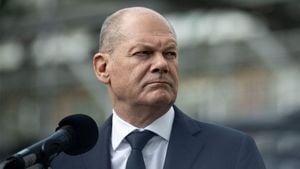Texas Governor Greg Abbott recently put Texas Children’s Hospital and Baylor College of Medicine on notice, threatening to pull their funding after Dr. Tony Pastor, a cardiologist at Texas Children’s, went viral on TikTok for advising patients on handling immigration-related questions on intake forms. The social media post, which has since been deleted, sparked significant backlash from the state’s highest office and stirred up discussions about healthcare access for immigrants and the ethical responsibilities of healthcare providers.
On November 11, 2024, Dr. Pastor shared with his audience information indicating they did not need to answer the citizenship question required by the executive order he labeled as potentially harmful. His TikTok video quickly garnered over one million views before it was removed. He described the situation, stating, “So my proposal to everyone who’s seeing this is, just know you do not have to answer this question.” Pastor expressed his concerns about the discomfort experienced by healthcare professionals under Abbott's new order, which requires hospitals to ask patients if they are U.S. citizens.
Abbott's executive order, which took effect on November 1, mandates hospitals participating in Medicaid or the Children’s Health Insurance Program to ask: "Are you a U.S. citizen?" This move has been framed as part of Abbott's broader strategy to hold the Biden administration accountable for what he describes as “reckless open border policies.” Abbott argued this order was necessary to report healthcare costs incurred by undocumented immigrants, thereby attempting to shift the financial burden onto the federal government.
The tension escalated when Abbott took to X (formerly Twitter) on November 24, 2024, to directly accuse Texas Children’s Hospital and Baylor College of Medicine of putting their public funding at risk due to Pastor’s statements. He warned them urgently, “This doctor is putting your Medicaid & Medicare funding at risk. You [better] think twice & have crystal clear records.” Abbott followed up with promises of consequences should the hospitals fail to adhere strictly to his executive order.
Dr. Pastor responded to Abbott’s threats, voicing his opinion on social media and stating he feels free to express his thoughts on such matters. “When the gov of Texas threatens you on Twitter because he is mad you exercised freedom of speech,” he stated on TikTok. His remarks were reminiscent of previous discussions highlighting the intent behind the citizenship questions, which he described as nothing short of smokescreens under the premise of data collection on undocumented patients.
Despite the backlash and commentary from various quarters, Texas Children’s Hospital immediately issued support for Abbott’s directive. A representative affirmed the hospital's commitment to complying with the executive order, asserting they had worked closely with the Texas Hospital Association to align their practices with the law. “We will continue to prioritize patient care...” the statement read, emphasizing their adherence to legal directives even as individual staff viewpoints may vary.
Interestingly, other medical groups and health authorities throughout Texas have echoed Dr. Pastor’s sentiments, promoting messages to both patients and healthcare providers about their rights concerning the citizenship inquiry. A flyer distributed by the San Antonio Metropolitan Health District read, “You do not have to answer the citizenship question if you don’t want to. Your answer will not affect your care — you will not be turned away.” This public communication aims to alleviate fears and reinforce the protections surrounding access to emergency healthcare, regardless of immigration status.
The controversy raises significant questions about the intersection of healthcare and immigration policy, especially as it relates to vulnerable populations who may avoid healthcare facilities out of fear of deportation or scrutiny based on their immigration status. Many advocates worry these measures could lead to decreased access to necessary medical services, resulting in detrimental health impacts among undocumented populations.
On October 31, Dr. Pastor's TikTok touched on the notion of immigration, where he reflected on how his grandfather came to the United States for medical care. “It just drives me crazy...that we forget we are a nation of immigrants,” he remarked, positing his frustration about the fears fueled by policies like Abbott's. This empathy via personal anecdote thrives amid the flurry of political tensions.
Abbott's relationship with the medical establishment has faced scrutiny before, often finding himself at odds with medical professionals on various health-related matters. The pandemic was perhaps the most prominent example of conflicts between public health officials and state directives aimed at controlling the narrative around public health and safety.
Dr. Pastor's situation serves as the latest flashpoint, showcasing the fragility of relationships between healthcare providers and political actors, especially as such relationships gravitate toward contentious issues surrounding immigration and healthcare access. The incident has also sparked conversations across platforms about how social media can serve as both shields and swords for advocates speaking against systems of power.
While the fallout from this exchange continues, many are left pondering the broader impacts such policies might have, not just on individual healthcare providers but also on the communities they serve. Ensuring access to healthcare is raised to the forefront of both medical and political conversations, with many eager to see how these dialogues evolve.
The events preceding and subsequent to Dr. Pastor’s TikTok raise broader questions about the responsibilities of healthcare institutions, the rights of patients, and the moral dimensions associated with public health policies. These discussions are increasingly relevant as the country engages with the intersection of healthcare rights and immigration discourse.



